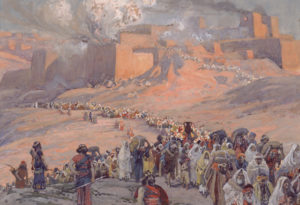Wishful Thinking or Genuine Hope?
Shout for joy to the LORD, all the earth.
Worship the LORD with gladness;
come before him with joyful songs.
Psalm 100:1-2
How has 2017 been for you? How are you dealing with the pace of change? For me, much of what I’ve taken for granted has become different, and I feel disoriented. Long held convictions and practices are being challenged, whether in international relations and national politics or in the fabric of social and personal relationships, both public and private. Familiar ways of being and behaving are quickly disappearing. Not all of that is bad, of course. Nevertheless, it is dizzying, and, if we are honest, much of it is disturbing. For many of us in the United States, at the roots of our distress is the movement from a relatively broad cultural consensus based on a Judeo-Christian worldview to one where such a view is, at best, in the minority. Mark Labberton, President of Fuller, describes it well: We’ve moved from living in “Christendom” to living in “exile.”

The Flight of the Prisoners, 1896-1902. By James Tissot.
In the middle of all that, we read and are invited to pray Psalm 100. Can we honestly “come before him with joyful songs” when we are in a state of exile? Perhaps not. We might well protest with the writer of another psalm, shaped in the context of Israel’s exile in Babylon: “How can we sing the songs of the LORD while in a foreign land?” (Psalm 137:4) Is praying Psalm 100 mere nostalgia about a past forever gone, or wishful thinking about a future that will never arrive? What is the basis of our hope in today’s text? Why do we rejoice and give thanks, even in exile?
Helpfully, the remainder of the Psalm does not leave us in the dark. “Know that the LORD is God” (100:3). The LORD is the creator of all things, and, as such, he has a responsibility to and for his creation. We are “the sheep of his pasture.” Although implied but not stated in this Psalm, and despite our current situation, he has a responsibility to make all things right in the end. But how do we know he will? “For the LORD is good and his love endures forever; his faithfulness continues through all generations.” (100:5) Unlike the gods of our imaginations, the LORD is both utterly good and entirely dependable. Contrary to the whispers of darkness, God is fully committed to our best interests. The Psalmist reminds us unequivocally: This is who the LORD is, and this is what ensures our hope in him is genuine.
Still, it is not easy to pray this in exile. Exile is an occasion for faith, not for sight. We do not yet see what we believe in and hope for. At best, what good we experience is but a foretaste of what is yet to come. And, sometimes, when we experience what we think will be the realization of our hopes, it turns out less than (or not at all) what we imagined. It’s useful to contemplate that when the people of Israel returned from physical exile in Babylon, their experience was full of disappointments. That should be both a warning and an encouragement to us. As T.S. Eliot, in his poem “Little Gidding,” wrote, “This is the use of memory: For liberation—not less of love but expanding of love beyond desire, and so liberation from the future as well as the past.”
Living in exile is an opportunity for the demonstration of faithfulness. In uncongenial, even hostile, circumstances, we are called to do our work faithfully. Much of what we do may seem insignificant. There may be less recognition that our work is of value, since what is valued has itself changed in the world around us. Still, we can—as an act of faith and faithfulness—sing the LORD’s song in a strange land. We can worship the LORD with gladness. We can even invite all the earth to celebrate, along with us, God’s gracious work in creating and sustaining the extraordinary universe he has made. “For the LORD is good and his love endures forever; his faithfulness continues through all generations.”
CONTEMPLATION:
Take a few minutes to ponder the attached art: The Flight of the Prisoners by James Tissot (1896-1902).
PRAYER:
LORD God, we find ourselves often disoriented and discouraged by the changes around us. What once we took for granted has disappeared. We long for times and places past, but we find ourselves now in a strange time and a foreign place.
We are grateful that although the world around us has changed, you remain the same. You are faithful and true. You are good to all, and your compassion is over all that you have made. You are faithful in all your words, and gracious in all your deeds.
And you are near to all who call on you. So hear us now as we pray. Amen.
Explore more at the Theology of Work Project online commentary:
Shout to the Lord?!

Uli Chi
Board Member, Senior Fellow, Affiliate Professor
Dr. Uli Chi’s career is a testament to his unique approach to leadership. He has navigated the realms of for-profit businesses, nonprofit organizations, the theological academy, and the local church, gleaning a wealth of wisdom from each. As an award-winning technological entrepreneur, h...


